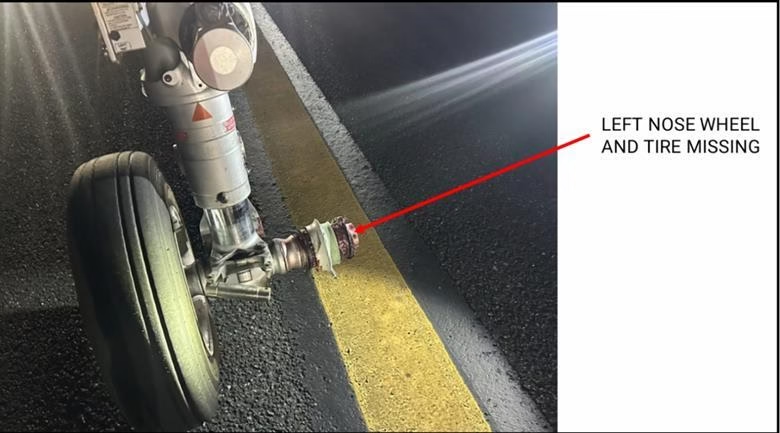Frontier A321neo Lost Nose Wheel, Suffered Engine Damage Due to April Hard Landing
**DENVER, CO** — A Frontier Airlines Airbus A321neo operating a domestic flight in April suffered significant damage, including the loss of its nose wheel and engine damage, following a hard landing at Denver International Airport (DEN), an internal investigation has revealed. The incident, which had not been previously disclosed to the public, raises new questions about maintenance practices and pilot training as the airline continues its rapid expansion.
### **The Incident: A Hard Landing Gone Wrong**
On April 12, 2025, Frontier Airlines Flight 612, an Airbus A321neo registered as N***FR (tail number withheld pending investigation), was arriving at Denver International Airport after a routine flight from Orlando International Airport (MCO). Weather conditions were reportedly calm, with light winds and clear visibility. However, as the aircraft descended onto Runway 16R, witnesses described an unusually hard touchdown.
According to preliminary reports from the Federal Aviation Administration (FAA), the aircraft’s landing was so forceful that the nose gear collapsed, shearing off the front wheel. The aircraft then skidded briefly before coming to a stop on the runway. Passengers reported hearing a loud bang followed by vibrations as the jet settled onto its damaged landing gear.
“It felt like we dropped the last few feet,” said one passenger, who asked to remain anonymous. “The plane bounced, then there was a scraping noise. People were looking around, but the crew kept everyone calm.”
While no injuries were reported, the aircraft sustained substantial damage. In addition to the detached nose wheel, one of the Pratt & Whitney PW1100G engines suffered internal damage from debris ingestion. The aircraft was subsequently towed to a maintenance hangar, where it remains out of service.
### **Behind the Scenes: Maintenance and Training Under Scrutiny**
Frontier Airlines, known for its ultra-low-cost business model, has faced criticism in recent years over maintenance delays and pilot fatigue. Sources within the airline suggest that the hard landing may have been exacerbated by a combination of factors, including possible pilot error and a last-minute change in landing procedures due to air traffic control instructions.
An anonymous maintenance technician told *Aviation Today* that the nose gear assembly showed signs of stress fractures prior to the incident. “These things don’t just snap off from one hard landing unless there was already a weakness,” the technician said.
The FAA has since launched a review of Frontier’s maintenance logs for its A321neo fleet. Of particular concern is whether the airline’s aggressive turnaround schedules—often as short as 30 minutes between flights—have led to deferred inspections.
Frontier Airlines, in a statement, denied any negligence: “Safety is our top priority. This incident was an isolated event, and we are cooperating fully with the FAA’s investigation. Our aircraft undergo rigorous maintenance checks, and our pilots are among the most highly trained in the industry.”
### **Industry-Wide Concerns Over A321neo Landing Gear**
This is not the first time an Airbus A321neo has experienced landing gear issues. In 2023, a similar incident involving another carrier resulted in an emergency landing after a nose gear failure. Aviation analysts suggest that the A321neo’s heavier weight and modified landing gear design—optimized for fuel efficiency—may make it more susceptible to stress fractures under extreme conditions.
John Cox, a retired airline captain and aviation safety consultant, noted that hard landings are not uncommon, but catastrophic gear failures are rare. “When you see a nose wheel detach, it usually points to either a structural defect or an unusually severe impact,” he said. “The question is whether this was a one-off or a symptom of a larger issue.”
### **What’s Next for Frontier and the FAA?**
The FAA is expected to issue a preliminary report within the next month. Depending on its findings, Frontier could face increased scrutiny over its operational practices. Meanwhile, the damaged A321neo remains grounded, with repair costs estimated in the millions.
For passengers, the incident serves as a reminder of the unseen stresses of modern aviation. While flying remains one of the safest modes of transportation, the pressure on airlines to maximize efficiency can sometimes lead to overlooked risks.
As for Flight 612’s passengers, Frontier offered vouchers for future travel—a standard practice, but one that does little to address the deeper questions raised by this near-miss.
**Updates to follow as the investigation progresses.**
—
*James Carter has been covering aviation for over 15 years. Follow him on Twitter @JCarterAvNews for the latest updates.*
—
